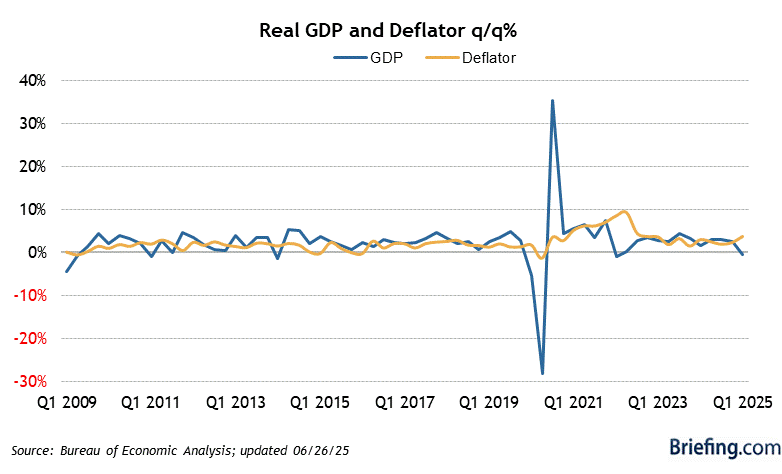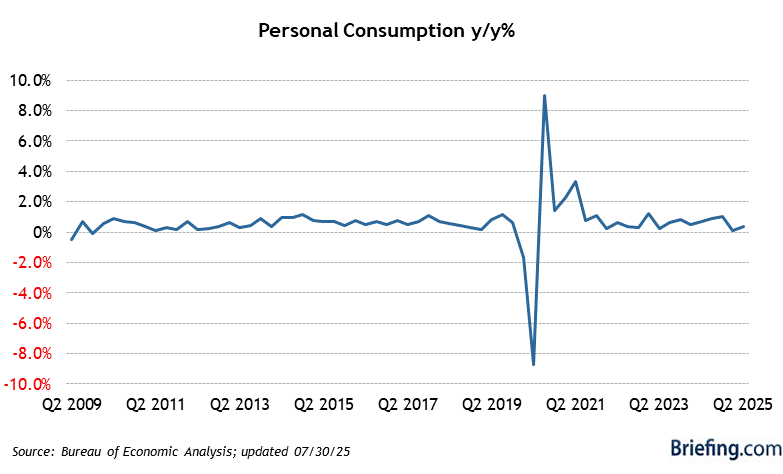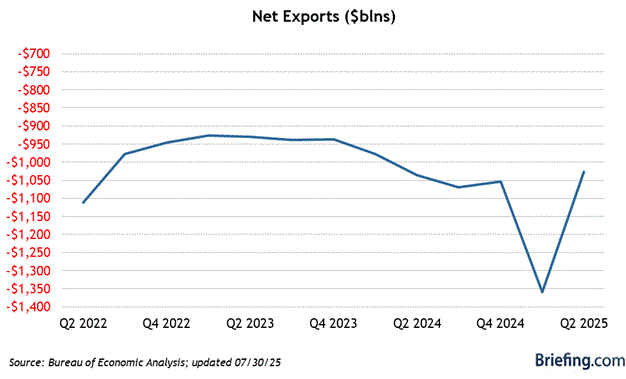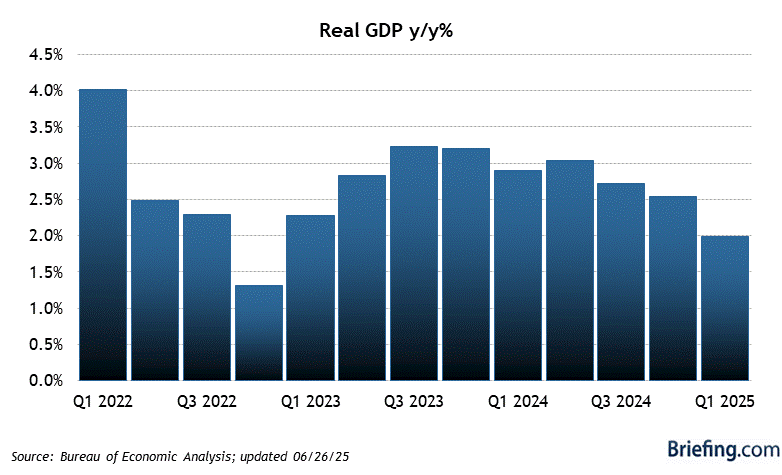Updated: 22-Jan-26 09:18 ET
| Q3 GDP-Adv. |
| Updated: 22-Jan-26 09:18 ET |




Highlights
- Q3 real GDP was revised slightly higher to 4.4% (Briefing.com consensus: 4.3%) from the advance estimate of 4.3%, with an upward revision to exports and investment superseding a slight downward revision to consumer spending.
- The GDP Deflator was unrevised at 3.8% (Briefing.com consensus: 3.7%).
Key Factors
- Personal consumption expenditures increased 3.5% versus 2.5% in the second quarter. The PCE component contributed 2.34 percentage points to real GDP growth in the third quarter.
- Gross private domestic investment was flat versus a 0.3% decline in the advance estimate and a 13.8% decline in the second quarter. Gross private domestic investment contributed 0.03 percentage points to growth in the third quarter.
- Exports increased 9.6% versus 8.8% in the advane estimate and a 1.8% decline in the second quarter. Imports fell 4.4% versus a 4.7% decline in the advance estimate and a 29.3% decline in the second quarter. Net exports added 1.62 percentage points to growth in the third quarter.
- Government spending increased 2.2% following a 0.1% decline in the second quarter. Government spending contributed 0.38 percentage points to real GDP growth in the third quarter.
- Real final sales of domestic product, which excludes the change in private inventories, increased 4.5% versus 4.6% in the advance estimate and a 7.5% increase in the second quarter. Real final sales to private domestic purchasers increased 2.8% versus 3.0% in the advance estimate and a 2.9% increase in the second quarter.
- The personal savings rate as a percentage of disposable personal income decreased to 4.2% from 5.0% in the second quarter.
- The PCE price index increased 2.8% versus 2.1% in the second quarter. The core PCE price index, which excludes food and energy, increased 2.9% versus 2.6% in the second quarter.
Big Picture
- The key takeaway from the report is that it is a dated and little-changed report, so its market-moving capacity is nil; however, it is a headline reminder that the economy was running on the hotter side of things in the third quarter.
| Category | Q3 | Q2 | Q1 | Q4 | Q3 |
| GDP | 4.4% | 3.8% | -0.6% | 1.9% | 3.3% |
| Inventories (change) | -$23.9B | -$18.3B | $172.0B | $17.1B | $69.4B |
| Final Sales | 4.5% | 7.5% | -3.2% | 2.8% | 3.5% |
| PCE | 3.5% | 2.5% | 0.6% | 3.9% | 4.0% |
| Nonresidential Inv. | 3.2% | 7.3% | 9.5% | -3.7% | 3.5% |
| Structures | -5.0% | -7.5% | -3.1% | -8.1% | -2.2% |
| Equipment | 5.2% | 8.5% | 21.4% | -4.3% | 8.2% |
| Intellectual Property | 5.6% | 15.0% | 6.5% | -0.6% | 3.1% |
| Residential Inv. | -7.1% | -5.1% | -1.0% | 4.3% | -4.8% |
| Net Exports | -$955.5B | -$1058.0B | -$1380.7B | -$1069.0B | -$1064.9B |
| Export | 9.6% | -1.8% | 0.2% | -0.9% | 8.9% |
| Imports | -4.4% | -29.3% | 38.0% | -0.2% | 10.1% |
| Government | 2.2% | -0.1% | -1.0% | 3.3% | 5.4% |
| GDP Price Index | 3.8% | 2.1% | 3.6% | 2.4% | 1.8% |
|
|